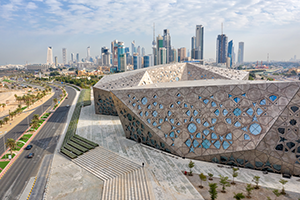


Kuwait
Kuwait, a small but significant country in the northeastern part of the Arabian Peninsula, borders Iraq to the north and Saudi Arabia to the south. With its strategic position at the head of the Persian Gulf, Kuwait has long been a key player in regional politics and commerce. Its Gulf coastline provides a prime location for trade and maritime activities, linking it to global shipping routes.
Kuwait’s climate is characterised by extremely hot summers and mild winters. During the peak summer, temperatures often exceed 50°C (122°F). The country experiences minimal rainfall and is predominantly desert, significantly influencing its unique landscape and lifestyle. Despite these harsh weather conditions, Kuwait’s modern infrastructure and urban development have made it a thriving centre of activity and commerce.
Kuwait is renowned for its significant oil reserves, which form the backbone of its economy. As one of the world’s leading oil producers, the country enjoys substantial wealth and economic stability. This oil wealth has enabled Kuwait to invest heavily in infrastructure, education, and healthcare, contributing to its high standard of living and rapid development. Additionally, Kuwait is known for its rich cultural heritage and historical sites, blending tradition with modernity uniquely and dynamically.
Visa Eligibility, Types and Process
Visa Eligibility
Kuwait’s job market is dynamic and heavily influenced by its oil-rich economy. The country offers a range of opportunities, particularly in the oil and gas sector, which remains the backbone of its employment landscape. Additionally, there are growing prospects in finance, healthcare, and education as Kuwait diversifies its economy and invests in infrastructure and development projects. Expats comprise a significant workforce, reflecting the country’s reliance on foreign talent to drive economic progress. The competitive job market requires candidates to have relevant qualifications and experience, with a strong emphasis on specialised skills and professional expertise.
Applicants must meet several criteria to be eligible for a work visa in Kuwait:
- Job Offer and Sponsorship: You must have a confirmed job offer and a sponsor.
- Genuine Traveler: You need to demonstrate that you are a genuine traveller.
- Clean Criminal Record: You should not have any criminal history.
- Health Requirements: You must meet the health standards set by the authorities.
- Intention to Return: You should intend to return to your home country after your employment.
- Financial Stability: You must have sufficient funds to support yourself during your stay in Kuwait.
Application Process
To work in Kuwait, employees typically need to secure a residency visa. This process begins with obtaining an employment offer from a private company or a government entity. The employer is responsible for applying for a work permit or visa on behalf of the employees.
- Job Offer: Employees must first receive a job offer from a Kuwaiti employer. The employer is generally responsible for starting the visa application process.
- Work Permit: The Kuwaiti employer applies for a work permit through the Ministry of Social Affairs and Labor.
- Security Clearance: After the work permit is issued, the employer must obtain security clearance from the Ministry of Interior.
- Medical Checkup: The employee must undergo a medical examination in their home country, including tests for infectious diseases.
- Visa Application: With the required approvals, the employer can apply for a work visa at the immigration department.
- Documents Required: Essential documents for the visa application include:
- A passport valid for at least six months.
- A completed visa application from the Kuwait Ministry of Foreign Affairs.
- A passport-size photograph.
- An HIV/AIDS test result.
- A health certificate from a local doctor confirming the applicant’s good health and absence of contagious diseases.
- A police clearance certificate indicating no criminal record.
- Visa Approval: Once approved, the work visa is issued, allowing the employee to travel to Kuwait. Additional medical tests may be required upon arrival.
- Arrival in Kuwait: Upon entering Kuwait, the employee must apply for a residency permit with assistance from the employer, involving further paperwork.
- Kuwait Civil ID: The employee should apply for a Kuwait Civil ID within 30 days of receiving the residency visa.
These steps ensure the employee’s legal status and readiness to work in Kuwait.
Visa Types
In Kuwait, work visas and permits are governed by Articles 17 and 18 of the immigration regulations. Article 17 applies to those seeking employment in the public sector, while Article 18 is designated for those in the private sector. The Ministry of Interior issues the visa for employment in Kuwait.
Kuwait provides various types of visas tailored to different purposes, entry requirements, and lengths of stay. These include:
Tourist Visa
Allows visitors to travel around Kuwait; basic personal information and passport details are required.
Visit Visa
For specific visit purposes, sponsorship from a Kuwaiti company or relative is required
Residence Visa
Needed for expatriates (excluding Gulf Cooperation Council (GCC) citizens) to live in Kuwait; includes work, domestic, and dependent visas.
Entrance Visa
Issued to government and civil sector employees; allows them to sponsor others with a financial requirement.
Visa Fees
The cost of a Kuwait work visa can vary depending on several factors, including the type of visa, the applicant’s nationality, and the processing fees set by Kuwaiti authorities. Generally, the total cost includes:
Work Permit Fee
Typically ranges from KD 100 to KD 250 (approximately USD 330 to USD 825).
Residency Visa Fee
Between KD 10 and KD 30 (about USD 33 to USD 100) per year.
Medical Checkup and Health Certificate
Costs can vary, often between KD 20 and KD 50 (approximately USD 65 to USD 165).
Additional fees for document processing, legal services, or administrative charges might be incurred. For the most accurate and up-to-date information on visa costs, check with the Kuwaiti Ministry of Interior or a local immigration consultant.
Benefits of Working in Kuwait
01
Tax-Free Salary: Kuwait offers tax-free income, meaning employees can retain their entire salary without deductions for personal income tax.
02
Competitive Compensation: Salaries in Kuwait are generally competitive, and many employment packages include allowances for housing, transportation, and sometimes education for dependents.
03
High Standard of Living: Kuwait provides a high standard of living with modern amenities, excellent healthcare facilities, and well-maintained infrastructure.
04
Safety and Stability: The country is known for its protection and political stability, offering a secure environment for both work and personal life.
05
Career Opportunities: Kuwait's growing economy offers diverse career opportunities, particularly in sectors like oil and gas, finance, healthcare, and education.
06
Multicultural Environment: Kuwait has a significant expatriate population, which makes it a great place to work and network with professionals from various backgrounds.
07
Proximity to Other Destinations: Kuwait is conveniently located near other Middle Eastern countries and international travel hubs in the Gulf region.
08
High-Quality Healthcare: Kuwait's healthcare system provides access to high-quality medical services and facilities.
09
Education Options: Several international schools and educational institutions offer quality education options for expatriate families.
10
Luxurious Lifestyle: Kuwait features modern shopping centres, fine dining, and recreational facilities, providing a comfortable and enjoyable lifestyle.
Conclusion
Kuwait’s vibrant job market, driven by its substantial oil reserves, provides diverse opportunities for career advancement, particularly in sectors such as oil and gas, finance, healthcare, and education. Kuwait’s modern infrastructure, safety, and multicultural environment make it an attractive destination for expatriates seeking professional growth and a comfortable lifestyle.
However, it is essential to recognise that Kuwait does not offer a pathway to citizenship for expatriates. Foreign workers can live and work in Kuwait through residency visas and work permits but cannot attain Kuwaiti citizenship. On a positive note, most employers in Kuwait include health insurance in their employment packages, ensuring expatriates have access to high-quality medical care. Despite the citizenship limitation, Kuwait remains a highly appealing destination for expatriates due to its economic opportunities and quality of life.
